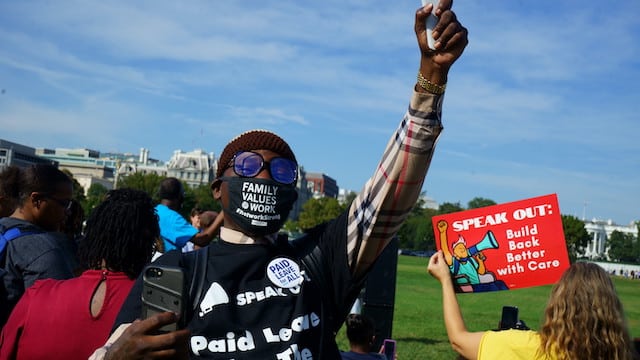Orange mandatory-sick-time initiative gains steam

In what may be the biggest political campaign in Central Florida right now, an army of paid and volunteer petition workers is swarming through Orange County.
They aren’t pushing a candidate. Rather, they are trying to earn a spot on the November ballot for an initiative that would require businesses to offer their employees sick time. It’s a daunting task: So many petition signatures are required that no citizen initiative has ever made it on the ballot in Orange County.
But that may be about to change: The sick-time campaign is gathering signatures at a furious pace — several thousand a day — and is on pace to be the first to make it.
“We’ll win,” said organizer Stephanie Porta. “People are shocked that everyone doesn’t have it. There is cross-party support.”
A coalition of progressive groups launched the initiative in May, at first focusing only on businesses within Orlando. But the county elections supervisor has a policy that prohibits cities from placing local questions on countywide ballots in presidential years, so two weeks later the group widened its campaign to the whole county.
To earn a ballot spot, the coalition known as Citizens for a Greater Orange County must gather 43,605 signatures from registered voters. And those voters can’t be from one area of the county; 7 percent of the voters in each County Commission district have to sign. County code gives petition drives a 180-day deadline, which is very tight, but activists are trying to do it in less than half that time.
So far, they’ve submitted nearly 28,000 signatures, but not all been certified by elections officials yet.
About 225,000 workers in Orange County, or 46 percent of the private-sector work force, do not receive paid sick time. The area’s tourism industry relies on cheap labor for its attractions, hotels and restaurants, and activists say workers often can’t afford to take an unpaid day off — or face disciplinary action or firing if they do. Some are forced to choose between their job and caring for a sick child.
The ballot question would require businesses with at least 15 full- or part-time employees to offer paid sick time. Workers would earn one hour of sick time for every 37 hours they work, up to a maximum of 56 hours of sick time.
Small businesses with fewer than 15 employees would not have to offer paid sick time, but they would not be allowed to retaliate against workers who take unpaid time off because they or a family member is sick.
In 2007, San Francisco became the first U.S. city to mandate paid sick days for all workers. Milwaukee followed in 2008, but Wisconsin Gov. Scott Walker last year signed legislation pre-empting local laws. Last year, Seattle enacted legislation, and Connecticut became the first state to adopt a paid-sick-time law.
The Orange County initiative would be the first in the Southeast.
Citizens for a Greater Orange County is paying workers to gather signatures. There are three shifts of 70 people canvassing neighborhoods with lists of registered voters; standing in front of shopping centers; visiting community events and churches; and even staking out the main bus stops used by Disney workers.
An additional 40 or so volunteers are doing the same thing, and members of the groups that belong to the coalition — such as Organize Now, Mi Familia Vota, Equality Florida, the National Association for the Advancement of Colored People and Federation of Congregations United to Serve — also are circulating petitions.
They talk to voters about the economic stability and productivity they say the initiative would bring, but also about the public-health risk. The Centers for Disease Control and Prevention estimates more than 1,300 food-borne illness outbreaks are reported annually, with transmission from food-service workers often a contributing factor.
A study published last year in the Journal of Food Protection found that nearly 20 percent of restaurant workers had gone to work in the past year with an illness causing vomiting or diarrhea. In 2008, more than 500 people who dined at a Chipotle restaurant in Kent, Ohio, were stricken with norovirus that public-health officials traced to a sick employee.
“Restaurant workers shouldn’t go to work ill,” said Dr. Kevin Sherin, Orange County Health Department director. “If they’re having a diarrheal illness especially, because those are the things that are contagious from a food-borne standpoint.”
Even so, supporters expect a fight from business groups.
Last year, industry groups representing retailers, restaurants, hotels and small businesses helped defeat a similar initiative in Denver. The National Restaurant Association poured $100,000 into the fight.
Mandatory sick pay raises costs for restaurants, which have to find another employee to work an ill one’s shift, said Scott DeFife, the trade group’s executive vice president of policy and government affairs. So in effect, he said, they pay twice.